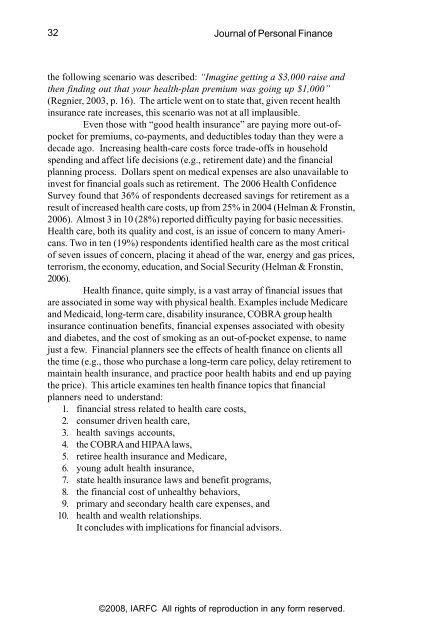3433-vol. 6 issue 2-3.pmd - iarfc
3433-vol. 6 issue 2-3.pmd - iarfc
3433-vol. 6 issue 2-3.pmd - iarfc
Create successful ePaper yourself
Turn your PDF publications into a flip-book with our unique Google optimized e-Paper software.
32<br />
Journal of Personal Finance<br />
the following scenario was described: “Imagine getting a $3,000 raise and<br />
then finding out that your health-plan premium was going up $1,000”<br />
(Regnier, 2003, p. 16). The article went on to state that, given recent health<br />
insurance rate increases, this scenario was not at all implausible.<br />
Even those with “good health insurance” are paying more out-ofpocket<br />
for premiums, co-payments, and deductibles today than they were a<br />
decade ago. Increasing health-care costs force trade-offs in household<br />
spending and affect life decisions (e.g., retirement date) and the financial<br />
planning process. Dollars spent on medical expenses are also unavailable to<br />
invest for financial goals such as retirement. The 2006 Health Confidence<br />
Survey found that 36% of respondents decreased savings for retirement as a<br />
result of increased health care costs, up from 25% in 2004 (Helman & Fronstin,<br />
2006). Almost 3 in 10 (28%) reported difficulty paying for basic necessities.<br />
Health care, both its quality and cost, is an <strong>issue</strong> of concern to many Americans.<br />
Two in ten (19%) respondents identified health care as the most critical<br />
of seven <strong>issue</strong>s of concern, placing it ahead of the war, energy and gas prices,<br />
terrorism, the economy, education, and Social Security (Helman & Fronstin,<br />
2006).<br />
Health finance, quite simply, is a vast array of financial <strong>issue</strong>s that<br />
are associated in some way with physical health. Examples include Medicare<br />
and Medicaid, long-term care, disability insurance, COBRA group health<br />
insurance continuation benefits, financial expenses associated with obesity<br />
and diabetes, and the cost of smoking as an out-of-pocket expense, to name<br />
just a few. Financial planners see the effects of health finance on clients all<br />
the time (e.g., those who purchase a long-term care policy, delay retirement to<br />
maintain health insurance, and practice poor health habits and end up paying<br />
the price). This article examines ten health finance topics that financial<br />
planners need to understand:<br />
1. financial stress related to health care costs,<br />
2. consumer driven health care,<br />
3. health savings accounts,<br />
4. the COBRA and HIPAA laws,<br />
5. retiree health insurance and Medicare,<br />
6. young adult health insurance,<br />
7. state health insurance laws and benefit programs,<br />
8. the financial cost of unhealthy behaviors,<br />
9. primary and secondary health care expenses, and<br />
10. health and wealth relationships.<br />
It concludes with implications for financial advisors.<br />
©2008, IARFC All rights of reproduction in any form reserved.
















